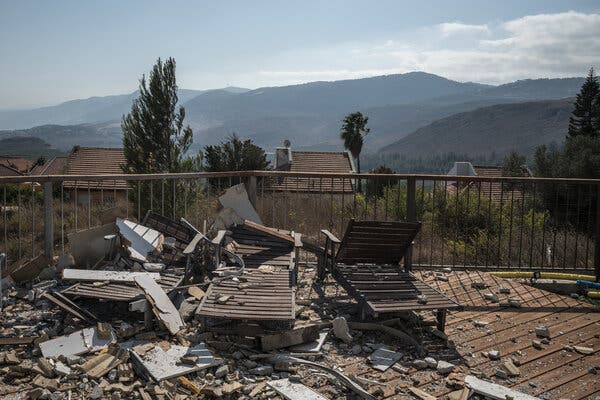Yoav Gallant and Defense Secretary Lloyd J. Austin III were expected to discuss Israel’s response to the Iranian missile assault on Israel last week.

Israel’s defense minister, Yoav Gallant, postponed a visit to Washington on Wednesday to meet with Defense Secretary Lloyd J. Austin III to discuss Israel’s military response to Iran’s recent missile barrage, the Pentagon said on Tuesday.
Sabrina Singh, the deputy Pentagon press secretary, declined to say why Mr. Gallant had postponed the visit and referred all questions to the Israeli Defense Ministry, which, she said, had informed the Pentagon of the decision on Tuesday.
Ms. Singh played down the notion that any tensions between Mr. Austin and Mr. Gallant were behind the postponement, and did not comment on whether internal Israeli political machinations might have prompted the decision.
“We’re in constant communication with the Israeli government at different levels, including the secretary to Minister Gallant,” Ms. Singh told reporters. “We’re going to keep talking to them about their response.”
President Biden has said he would not support an Israeli strike against Iranian nuclear or energy sites in response to the missile attack on Israel last week, saying that any response should be “proportionate,” essentially acknowledging that some counterstrike is appropriate.
The president and Prime Minister Benjamin Netanyahu of Israel last spoke on Aug. 21 by phone, according to a White House statement.
In a phone call on Sunday, Mr. Austin made clear to Mr. Gallant that the United States wanted Israel to avoid retaliatory steps that would result in a new escalation by the Iranians, a senior Pentagon official said on Monday. The two men had been expected to discuss options in more detail in the face-to-face meeting on Wednesday.
As Israel’s offensive against Hezbollah in Lebanon expands to include ground incursions and intensifying airstrikes, senior Pentagon officials are mulling whether the enhanced American military presence in the region is containing a widening war, as they had hoped, or inflaming it.
In the 12 months since Hamas has attacked Israel, opening a conflict that includes Yemen, Iran and Lebanon, the Pentagon has sent a bristling array of weaponry to the region, including aircraft carriers, guided-missile destroyers, amphibious assault ships and fighter squadrons. But Pentagon officials complain that the Israelis have not been completely candid or timely in alerting the United States to impending Israeli operations, including its assassination of Hezbollah’s leader, Hassan Nasrallah.
Mr. Gallant had informed Mr. Austin during a phone call as the Israeli operation was underway. Pentagon officials said Mr. Austin was seething that the Israelis had not given more notice to allow American troops in the region to increase defensive measures against likely Iranian retaliation.
When asked about Mr. Austin’s reaction, Ms. Singh told reporters that “he was caught off guard.”
Ephrat Livni contributed reporting.
Eric Schmitt is a national security correspondent for The Times, focusing on U.S. military affairs and counterterrorism issues overseas, topics he has reported on for more than three decades. More about Eric Schmitt



